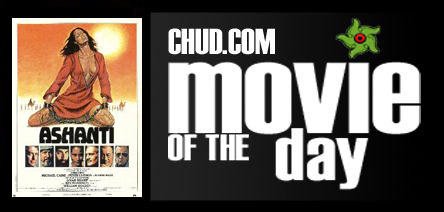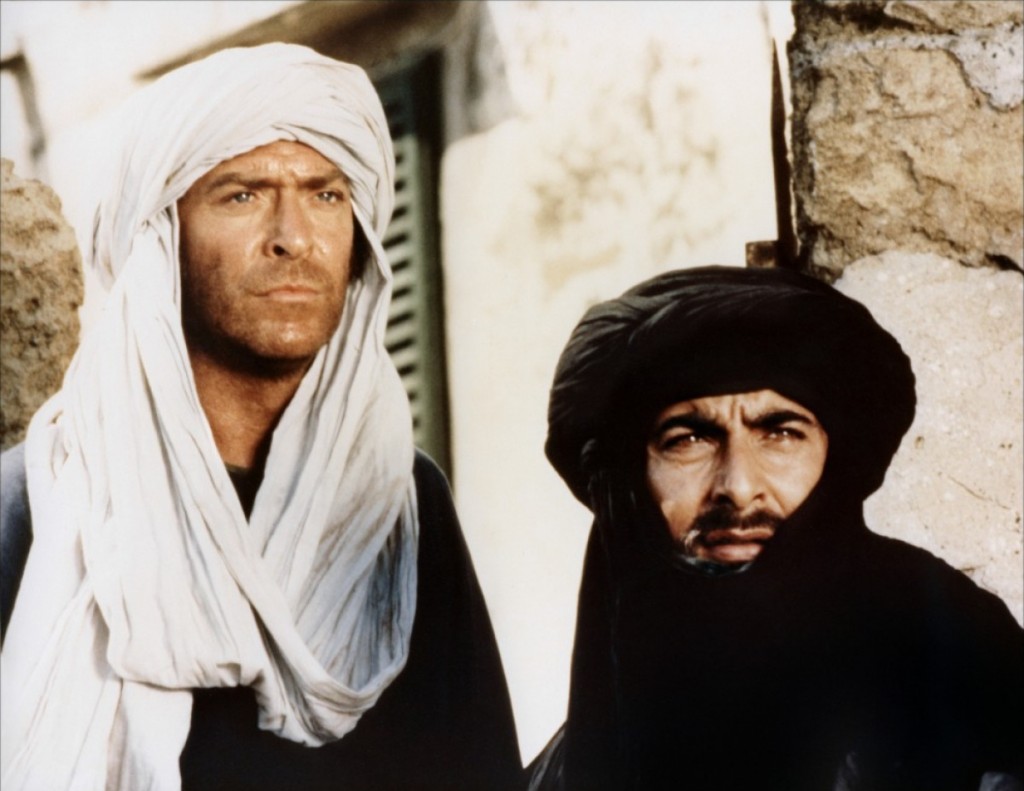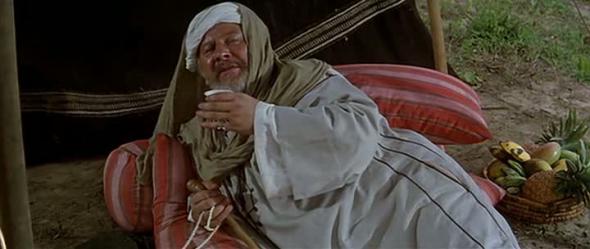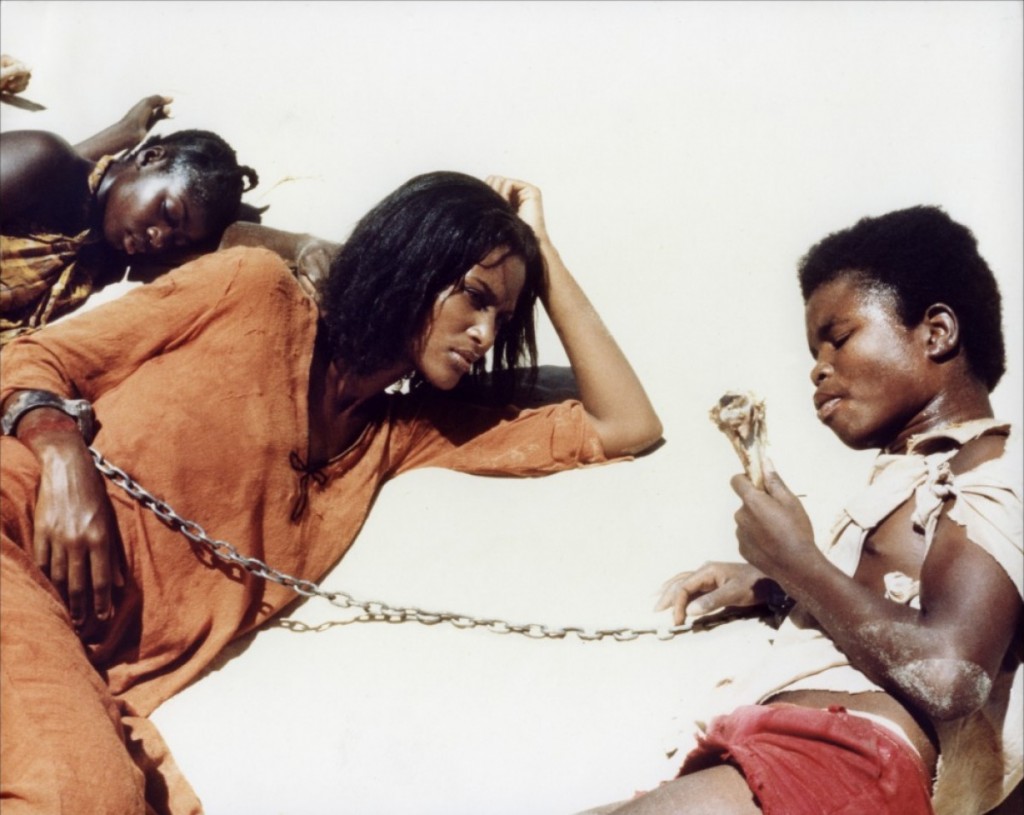
The Film: Ashanti (1979)
The Principals: Michael Caine, Peter Ustinov, Kabir Bedi, Beverly Johnson, Omar Sharif, Rex Harrison, William Holden. Directed by Richard Fleischer.
The Premise: David Linderby (Caine) and his beautiful wife, Anansa (Johnson), are two British doctors working with the World Health Organization in West Africa. When Anansa decides to go skinny dipping alone in the river, she winds up kidnapped by Suleiman (Ustinov), an Arab slave trader. Now David needs to get his shit together and track Suleiman down before the Arab can get Anansa off the continent and sold into slavery forever. Linderby first gets help from a member of the Anti-Slavery League (Harrison) and a mercenary helicopter pilot (Holden), before teaming up with Malik (Bedi) a tribesman who is seeking his own revenge on Suleiman. Together Linderby and Malik adventure across the Sahara becoming friends and shit. Then eventually Omar Sharif is in the movie too.

Is It Good: No. Though Ashanti‘s true disappointment isn’t as a movie, but as movie-trash. The premise is terrifically cheesy — Taken meets Lawrence of Arabia, from the director of Mandingo, with an all-star Oscar-winning cast, an eye-catching exploitation poster, and Peter Ustinov as an Arab? You’d normally need to fight me off with a stick to stop me from watching this movie. The prospects of Ashanti actually being a good film were never really in question, but it practically promises to be scrumptiously salacious garbage of the best vintage. Yet despite what that poster and the film’s details would imply, the film is hardly salacious. What it is, is clunkily paced and mostly boring.
Director Richard Fleischer had a very prolific, varying, and uneven career. He swung around from films like Disney’s 20,000 Leagues Under the Sea and the original Dr. Doolittle, to darker films like The Vikings, Compulsion and Soylent Green, before closing things out in the 1980s with odd junk like The Jazz Singer remake, Amityville 3-D and Red Sonja. Fleischer was capable of good things, and bad things. Ashanti is a bad thing. But unlike, say, The Jazz Singer, the film never quite crosses the line into hilarious terribleness. It stays stuck firmly in a confused mid-range. What kind of film is Ashanti supposed to be? The cast and expensive far-flung location shoot would seem to imply that it wants to be an A-picture adventure movie. But the premise and several key scenes would seem to imply that it wants to be a down and dirty exploitation B-movie. The text we’re presented with in the film, supposedly giving us the true facts about the modern slave trade, could take things either way — either offering a genuine expose, like Blood Diamond, or simply providing a loose spring board for a totally preposterous tale. But Fleischer never makes up his mind what he’s going for. (I’ve read that he had to be removed from the film 2/3s into shooting because he suffered heat stroke, but the problems were already well cemented by that point.)
The biggest problem is tone. Taken is a ridiculous movie. Part of what makes it work (aside from good pacing), is that it is taking itself so seriously. Ashanti seems to think it can take breaks from being serious. Large breaks. For one thing Peter Ustinov is playing the film’s villain. Peter Ustinov. I love Ustinov, and he’s playing things typically Ustinovian. But typical Ustinov does not seem right for the nature of either his character or the film itself. His whimsical attitude and his doofy banter with his idiot underlings completely undercuts what is supposed to be disturbing and, well, villainous. At least I assume it is all supposed to be disturbing. He grants one of his henchman permission to rape a little African boy they captured, which the henchman then does. All while Ustinov is barely even trying to do an Arabic accent, and smirkily affecting his way around like he’s still in Blackbeard’s Ghost. And Suleiman’s dialogue about his family back home and plans for retirement should be there to make us hate him all the more, demonstrating how emotionally detached he is from the horrors he commits — that he views his African abductees as cattle, oblivious and unconcerned that they have their own families and lives. But coming out of Ustinov’s mouth it all just seems so lovable. He’s Peter Ustinov! You want to love him! It just doesn’t work.

But the bigger tonal problem comes with Michael Caine’s scenes. Most of his storyline comes off like Planes, Trains, and Automobiles or something, like he’s just some frustrated city slicker out of his element, instead of a panicking husband desperately trying to rescue his wife on a continent where no one cares or wants to help him. There is no sense of urgency or tension. We’re repeatedly given ticking clocks, telling us how quickly Linderby needs to locate his wife, otherwise she’ll be gone forever! But the pacing is so casual, and often played for light banal humor — a scene in which Caine struggles to bond with him camel (one of the few jokes that is actually funny) feels like a scene from Romancing the Stone. Ha ha. Camels are ornery! Then we cut back to Anansa in chains, bonding with Butt-raped Boy.
In the all-too-brief moments the film embraces the darkness of its concept, it actually gets interesting; namely, a scene in which Malik goes full Liam Neeson on a band of slavers only to discover that it isn’t Suleiman’s gang. Malik wants to abandon the children he just rescued, who are now hundreds of miles from home stuck in the middle of the Sahara. Linderby knows they can’t leave the children there, or they will likely die. The two men argue, and you think Linderby is going to win out. Until Malik points out that if they take the children to safety, they’ll never find Anansa in time. So Linderby agrees to abandon the children. That is messed up. And perfect. But a tonally lone bit. Looking at the film from afar it seems like Ashanti is supposed to be a dark journey into desperation, following a reserved Brit pushed to the limits and forced to embrace his primal side to save his loved one. But it feels more like Linderby is trying to recover a valuable artifact or something of lesser life-and-death importance from Suleiman.
On paper much of Ashanti sounds a lot more interesting than it is. Like the fact that Butt-raped Boy turns out to be a witch doctor and kills one of his captors using black magic. How is that not awesome? I don’t know. Cause it isn’t. At two hours in length, Ashanti is a bit of a drag. It needs to be 30 minutes shorter, for one thing. But considering it probably was never going to reach its A-picture goal, it should have just embraced the cheese and gone for broke. It also needs a better score.
Ashanti isn’t completely without merits though. Aside from Beverly Johnson (a famous model at the time), the film does have a good cast. Omar Sharif is quite good as the slimy and sophisticated modern prince that Suleiman wants to sell Anansa too, but he does not appear until the film is almost over — at which point he replaces Ustinov as the villain, which is a screenwriting no-no. One thing that is undeniable, Ashanti looks great. The African locations are gorgeous and cinematographer Aldo Tonti does an excellent job capturing it all.

Is It Worth A Look: For the most part, no. There is nothing to be gained from the film. That said, film nerds of a certain age may get a kick out of seeing the respectable cast appearing together and slugging their way through the film. William Holden, in one of his final acting performances, is so poorly used in the film it is a little funny — swooping in briefly for a paycheck and then literally crashing and burning (and exploding) before his character even has time to develop a purpose. In this sense, Ashanti is somewhat amusing. Not enough to be a trash classic, but I suppose enough to provide for a lazy head-shaking afternoon TV viewing.
Random Anecdote: Michael Caine once said that Ashanti is worst film he’s ever made. Keep in mind, this was said by a man who didn’t get to accept his Academy Award in person because he was shooting Jaws IV.
